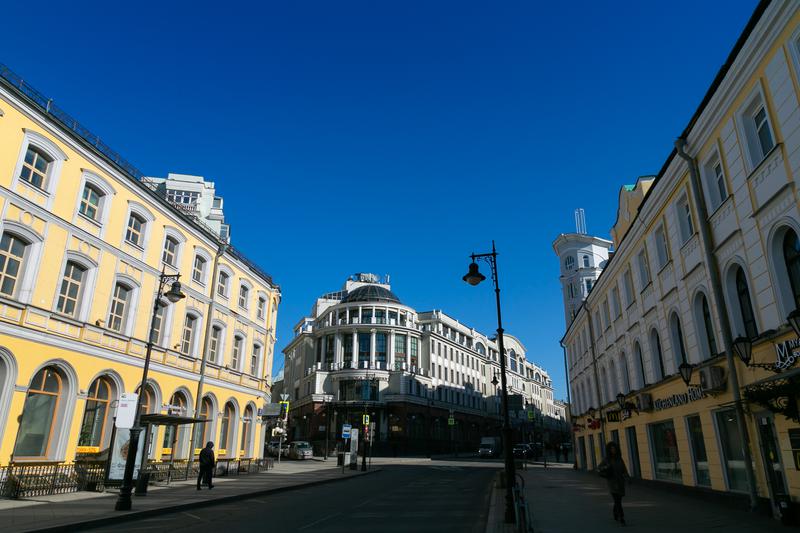Don't Doubt Your Ability and You Will Get Everything That Is Rightfully Yours at HSE’

Yuanqi Zhou, from China, is currently studying on the Master's in Comparative Social Research under Russian government scholarships and funding from the China Scholarship Council, while also working as a research assistant at Centre for Civil Society and Non-Profit Sector Studies. In this interview, Yanqi talks about scholarships, HSE University’s impressive academic resources, and the soothing qualities of a Moscow sky.
Yuanqi Zhou
Why did you choose HSE University?
As an undergraduate I studied economics at Shenzen MSU-BIT University, which is a partner university of Moscow State University and Beijing Institute of Technology in China, where I also studied Russian. The professors from MSU introduced me to HSE, and I chose it for two main reasons. Firstly, the HSE website is one of the clearest university websites I have ever seen, with the websites of each faculty and research centre following a uniform standard.
You can find almost any information you need on the website, including HSE's annual research results, the academic resources available to students, information about cooperation with other universities and organisations, and more
I already knew about the opportunities for students to join HSE's laboratories before I started here, which was a key reason why I chose HSE, and I think this is very attractive to anyone who loves academia. The second reason was that HSE has a lot of publicly funded quotas, which is very helpful to me. The pandemic has left a lot of people facing financial hardship, myself included. I didn't even have to actively apply for the full scholarship; I just took the HSE entrance interview and the admissions committee recommended me for the full scholarship directly, which made the process very easy.
How did you decide on your programme?
I studied economics as an undergraduate, but then I realised that I wanted to do cross-disciplinary research.
I am now studying in the Comparative Social Research programme, which is an English-taught programme with many international teachers, and my English skills have greatly improved
In addition, apart from the three compulsory ones, most of the courses are optional, which means that you can make your own study plan. Finally, almost all the courses take place after 6 pm, giving us lots of time during the day to take part in internships or work on our own research projects.
What do you like about your studies?
I really enjoyed the quantitative analysis courses like social data processing, R language, multi-level regression, etc. This is probably because HSE is very specialised in computer science, which is exactly what I wanted to study. The qualitative analysis course was also very good. The course that impressed me the most was ‘Ideological Analysis’ (a course taught in Russian by Roman Abramov and Oxana Mikhaylova), which was a bit difficult for me. To be honest, I only understood about half of it, but the material was very impressive to me.
Different countries have different theoretical systems, and at HSE I have been exposed to some theories and sociologists I had never heard of
In particular, this includes French sociologists such as Luc Boltanski, whose work is not translated in China but can be found in Russian at HSE, which was a great eye-opener for me. I would like to give a special mention to the HSE Library, which has a very large number of academic resources and allows us to access them remotely. There are also databases and electronic archives built by various HSE laboratories and containing data collected by HSE researchers. Many of these materials are unique, and I would not know of their existence if I had not come here.
What is your life in Moscow like?
I live in the south-western part of Moscow now. It is very quiet and there is very little traffic. I love the sky in Moscow. I can't describe the difference between it and the sky in China, but they are really different.
Whenever I have any difficulties, I look up at the wide-open sky and feel that Moscow and the world are so big that my troubles are just nothing compared to it
My favourite thing about Moscow is the metro. It's very convenient and fast—it's the best urban transport system I've ever seen.
How is your Russian?
My undergraduate course was taught by a Russian professor, so I can speak some Russian. However, if you have only studied Russian in class like me, you may still face some difficulties when you first arrive in Russia because academic Russian is not the same as Russian in daily life.
People in Moscow are very friendly and even if your Russian is poor, people will help you. So don't worry
What are your plans for the future?
My dream is to become a university professor or to continue working in a research institute. I am interested in social network analysis and social opinion monitoring using natural language processing. HSE has a laboratory that conducts this kind of research, which I hope to be able to do in the future.
Do you have any final words of advice for potential applicants to HSE University?
I think it is important to finish by stating one fact: HSE is fair. Some people have told me they are worried that they won't win the competition, and some commercial agencies say they can use ‘inside sources’ to help applicants get in. This is not true. In my experience, all you need to do is submit your CV and attend an interview. The whole process is very simple and transparent; don't doubt your ability and you will get everything that is rightfully yours at HSE.
International applicants can learn more about the Master’s in Comparative Social Research—including information on the admissions procedure, tuition fees, scholarship opportunities and more—on the programme’s website.

